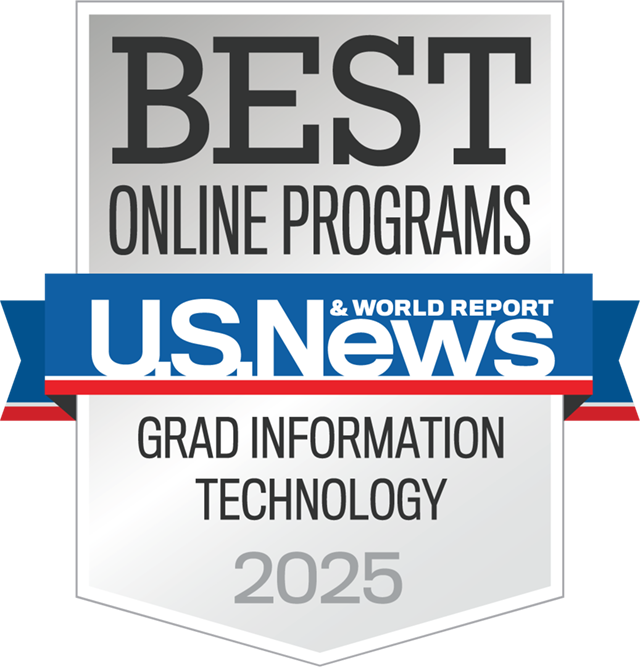100% Online
Complete your Penn State course work at your own pace and 100% online.
Application deadline
Credits and costs
Nationally Recognized

Gain Skills to Excel in the Field of Artificial Intelligence
Form intelligent systems and explore new frontiers in artificial intelligence (AI) and machine learning (ML).
Drive the design, development, and deployment of AI and ML products and services across a broad array of applications and industries.
Communicate the major issues of AI and its applications, including theories, approaches, findings, and technical and ethical implications.
Discriminate between state-of-the-art techniques in neural network architecture, machine learning, deep learning, and collective intelligence to determine the most appropriate approach for solving a given problem.
Immerse Yourself in State-of-the-Art Artificial Intelligence Courses
Immerse Yourself in State-of-the-Art Artificial Intelligence Courses
The Master of Artificial Intelligence degree courses can provide you with the skills and knowledge required to identify, acquire, process, and prepare relevant data sets; research, prototype, and develop algorithms to solve challenging computer vision, natural language, and multi-modal data-fusion tasks; and perform other emerging operations.
You can earn up to three related graduate certificates along the way to your Master of Artificial Intelligence. Students who plan to take the stackable credentials pathway to this degree should follow the course lists for each graduate certificate program. To earn each certificate, you must apply, gain acceptance to the program, and complete the required courses.
- Foundations of Artificial Intelligence (12 credits)
- Natural Language Processing (9 credits)
- Computer Vision (9 credits)
Students who are not pursuing stackable credentials can follow the full course list for the program.
You must successfully complete a total of 33 credits at the 400, 500, or 800 level, while maintaining a GPA of 3.0 or better in all course work, including:
- at least 21 credits of required core courses at the 500 or 800 level, with at least 6 credits at the 500 level
- at least 9 credits of electives
- 3 credits of A-I 894, an integrative research topics course, which includes a written paper
Capstone Course
You will apply your knowledge of the theories, methods, processes, and tools of AI, learned throughout your program, in a culminating and summative experience. The choice of project topic and exact form will be mutually determined by you and your instructor. A written paper based on the applied project is required and must contain project description, analysis, and interpretation of findings.
Core Courses (21 credits)
- 3credits
This course will cover the foundations on neural networks and deep learning networks. It covers the core concepts of deep neural networks, including the convolutional neural networks for image recognition, recurrent neural networks for sequence generation, and generative adversarial networks for image generation.
- Prerequisite
STAT 500
- 3credits
This course covers basic as well as advanced concepts to gain a detailed understanding of Natural Language Processing tasks such as language modeling, text to speech generation, natural language understanding, and natural language generation. Students can learn the necessary skills to design a range of applications, including sentiment analysis, translating between languages, and answering questions. The practical implementation of these applications with deep neural networks is also discussed.
- Prerequisite
STAT500 and A-I 570 or DAAN 570
- 3credits
This course will teach the foundations of AI and give students a practical understanding of the field. This course gives an overview of the core concepts of AI, including the intelligent agents, knowledge and reasoning, reinforcement learning, planning and acting, belief networks, computational learning, Markov decision process, and more.
- 3credits
The Ethics of Artificial Intelligence is the young branch of applied ethics that seeks to study the far-reaching and diverse ethical issues that arise with the widespread and rapid integration of AI technologies into various aspects of our lives.
- 3credits
This course focuses on the design of computer-based, machine vision systems using appropriate algorithms and best practices. Students will learn image representation and structuring; feature extraction and segmentation; and information extraction, filtering, and analysis.
- 3credits
This course will explore the development of analytics systems and the application of best practices and established software design principles using the Python programming language and its several toolkits.
- 3credits
Descriptive statistics, hypothesis testing, power, estimation, confidence intervals, regression, one- and two-way ANOVA, chi-square tests, diagnostics.
- Prerequisite
one undergraduate course in statistics
Electives (select 9 credits)
- 3credits
This course will cover the main theory and approaches of reinforcement learning, along with deep learning and common software libraries and packages.
- 3credits
Creative projects, including nonthesis research, that are supervised on an individual basis, and which fall outside the scope of formal courses.
- 3credits
Formal courses given on a topical or special interest subject which may be offered infrequently.
- 3credits
Practical benefits of data mining will be presented; data warehousing, data cubes, and underlying algorithms used by data mining software.
- Prerequisite
INSC 521, or approval of instructor or department
- 3credits
Examines tools and techniques required for data collection and computational procedures to automatically identify and eliminate errors in large data sets.
- Prerequisite
STAT 500
- 3credits
This course provides a foundation in the principles, concepts, techniques, and tools for visualizing large data sets.
- 3credits
The theory and application of several quantitative decision-making tools will be studied. The usefulness of these tools will be illustrated using projects and case studies throughout the course. Emphasis will be placed on the application of the tools and techniques and the results they generate.
- Prerequisite
STAT 500
- 3credits
Survey course on the key topics in predictive analytics. Students will learn methods associated with data analytics techniques and apply them to real examples using the R statistical system.
- Prerequisite
IE 323, STAT 500 or equivalent
- 3credits
The requirements capture, design, and development of relational database applications; analysis of business requirements and development of appropriate database systems.
Capstone Course (3 credits)
- 3credits
The choice of project topic and exact form will be mutually determined by you and your instructor. A written paper based on the applied project is required and must contain project description, analysis, and interpretation of findings.
Course Availability
If you're ready to see when your courses will be offered, visit our public LionPATH course search (opens in new window) to start planning ahead.
Start or Advance Your Career

Start or Advance Your Career
You can use the knowledge gained from this program and the support of Penn State career resources to pursue careers in a variety of fields, depending on your goals.
Job Titles Related to This Degree
This degree program can prepare you for employment in multiple fields, including business, technology, finance, government, and manufacturing, holding titles such as:
- Application Integration Engineer
- Application Programmer Analyst
- Artificial Intelligence Specialist
- Data Scientist
- Machine Learning Engineer
- Software Development Engineer
Employment Outlook for Occupational Fields Related to This Degree
Estimates of employment growth and total employment are provided by the U.S. Bureau of Labor Statistics and are subject to change. While these occupations are often pursued by graduates with this degree, individual outcomes may vary depending on a variety of factors. Penn State World Campus cannot guarantee employment in a given occupation.
Software Developers
Data Scientists
Computer Programmers
Career Services to Set You Up for Success

From the day you're accepted as a student, you can access resources and tools provided by Penn State World Campus Career Services to further your career. These resources are beneficial whether you're searching for a job or advancing in an established career.
- Opportunities to connect with employers
- Career counselor/coach support
- Occupation and salary information
- Internships
- Graduate school resources
Ready to Learn More?
Get the resources you need to make informed decisions about your education. Request information on this program and other programs of interest by completing this form.
Ready to take the next step toward your Penn State master's degree?
Costs and Financial Aid
Costs and Financial Aid
Learn about this program's tuition, fees, scholarship opportunities, grants, payment options, and military benefits.
Graduate Tuition
Graduate tuition is calculated based on the number of credits for which you register. Tuition is due shortly after each semester begins and rates are assessed every semester of enrollment.
2025–26 Academic Year Rates
| How many credits do you plan to take per semester? | Cost |
|---|---|
| 11 or fewer | $1,078 per credit |
| 12 or more | $12,933 per semester |
Financial Aid and Military Benefits
Some students may qualify for financial aid. Take the time to research financial aid, scholarships, and payment options as you prepare to apply. Federal financial aid may only be used to pay for credits used to satisfy program requirements.
Military service members, veterans, and their spouses or dependents should explore these potential military education benefits and financial aid opportunities, as well.
Additional Cost of Attendance Details
To view the detailed list of cost of attendance elements:
- visit the Tuition Information site
- click the plus sign to expand the table
- select a semester from the World Campus row
Technical Requirements
Review the technical requirements for this program.
Given the scale of data used in the artificial intelligence program and the continuous advances in tools and platforms used in AI/ML, students are urged to check individual course technical requirements vigilantly. At a minimum, students will need a PC that runs Windows 10 or higher with 5GB of RAM and 250GB of free space on the hard drive. Mac OS machines are not compatible for several courses in the program and are not recommended.
Earn Stackable Credentials on the Way to Your Degree

Earn Stackable Credentials on the Way to Your Degree
Earn graduate certificates while you work toward your degree. It’s a great way to quickly gain new skills and add valuable credentials to your résumé — without any additional course work, course fees, or application fees.
Finish the following three certificate requirements and the 3-credit capstone course, and you will have completed the requirements to earn your Artificial Intelligence master's degree. Please note you must apply and be accepted to each program on an individual basis, but you will not be charged application fees for any program beyond the first.
Complete All of These Certificates (30 credits)
This 12-credit online graduate certificate program focuses on the foundations of artificial intelligence, including intelligent agents, search and planning, machine learning, and predictive analytics. The certificate is embedded within the artificial intelligence master's program.
Learn more about the Graduate Certificate in Foundations of Artificial IntelligenceThis 9-credit graduate certificate focuses on natural language processing (NLP), a subfield of AI centered on the interaction between computers and human language. This certificate is embedded within the artificial intelligence master's program.
Learn more about the Graduate Certificate in Natural Language ProcessingThis online graduate certificate focuses on computer vision, the subfield of AI covering the design and applications of computer-based, machine vision systems that can interpret visual information and make decisions. The certificate is embedded within the artificial intelligence master's program.
Learn more about the Graduate Certificate in Computer VisionComplete the Capstone Course (3 credits)
After the certificate requirements have been met, you just need to complete the 3-credit capstone course to finish the master's.
Expand Your Theoretical and Practical Knowledge
Expand Your Theoretical and Practical Knowledge
Penn State is an associate member of the Linux Foundation® (LF AI and Data Foundation). Working in tandem with services available through the Nittany AI Alliance, this membership allows students to expand their experiences with AI technologies by providing opportunities to learn from, contribute to, and interact with companies pursuing AI projects.
You can also join a faculty-led student group that focuses on contemporary issues in AI and coordinates student teams for AI/ML events, including the American Statistical Association DataFest, Kaggle competitions, and the Nittany AI Challenge.
Set Your Own Pace

Set Your Own Pace
Whether you are looking to finish your program as quickly as possible or balance your studies with your busy life, Penn State World Campus can help you achieve your education goals. Many students take one or two courses per semester.
Our online courses typically follow a 12- to 15-week semester cycle, and there are three semesters per year (spring, summer, and fall). If you plan to take a heavy course load, you should expect your course work to be your primary focus and discuss your schedule with your academic adviser.
To Finish Your Degree in One to Two Years
- Take 3–4 courses each semester
To Finish Your Degree in Two to Three Years
- Take 2–3 courses each semester
To Finish Your Degree in Three to Four Years
- Take 1 course each semester
Timelines may vary based on course availability.
Convenient Online Format
This program's convenient online format gives you the flexibility you need to study around your busy schedule. You can skip the lengthy commute without sacrificing the quality of your education and prepare yourself for more rewarding career opportunities without leaving your home.
A Trusted Leader in Online Education

Penn State has a history of more than 100 years of distance education, and World Campus has been a leader in online learning for more than two decades. Our online learning environment offers the same quality education that our students experience on campus.
Information for Military and Veterans

Are you a member of the military, a veteran, or a military spouse? Please visit our military website for additional information regarding financial aid, transfer credits, and application instructions.
How to Apply to Penn State

How to Apply to Penn State
Apply by November 15 to start January 12
Application Instructions
Deadlines and Important Dates
Complete your application and submit all required materials by the appropriate deadline. Your deadline will depend on the semester you plan to start your courses.
Spring Deadline
Apply by November 15 to start January 12Summer Deadline
Apply by March 15 to start May 18Fall Deadline
Apply by July 15, 2026, to start August 24, 2026
Steps to Apply
For admission to the J. Jeffrey and Ann Marie Fox Graduate School, an applicant must hold either (1) a baccalaureate degree from a regionally accredited U.S. institution or (2) a tertiary (postsecondary) degree that is deemed comparable to a four-year bachelor's degree from a regionally accredited U.S. institution. This degree must be from an officially recognized degree-granting institution in the country in which it operates.
Students should hold a bachelor's degree in computer science, engineering, or mathematics to be considered for admission to the program. Students from other disciplines will be considered based on prior course work (including the entrance requirements for mathematics and programming) and standardized test scores. Students should have earned at least a 3.00 junior/senior GPA (on a 4.00 scale) in their baccalaureate program.
Mathematics Requirement
Applicants must complete Calculus I (equivalent to Penn State's MATH 140), 1 semester of probability or statistics, and 1 semester of linear algebra.
Programming Requirement
Applicants must complete two introductory-level programming courses where both courses used the same language. If an applicant believes his/her work experience satisfies the background, he/she should include a recommendation letter from a technical colleague describing the applicant’s coding contributions at work.
Applications are submitted electronically and include a nonrefundable application fee. You will need to upload the following items as part of your application:
Official transcripts from each institution attended, regardless of the number of credits or semesters completed. Transcripts not in English must be accompanied by a certified translation. If you are a Penn State alum, you do not need to request transcripts for credits earned at Penn State but must list Penn State as part of your academic history.
GPA — All applicants are expected to have earned a junior/senior grade-point average of 3.0 or higher.
GRE or GMAT — Scores are NOT required and will not be accepted.
English Proficiency — The language of instruction at Penn State is English. With some exceptions, international applicants must take and submit scores for the Test of English as a Foreign Language (TOEFL) or International English Language Testing System (IELTS). Minimum test scores and exceptions are found in the English Proficiency section on the Fox Graduate School's "Requirements for Graduate Admission" page. Visit the TOEFL website for testing information. Penn State's institutional code is 2660.
References (2) — You will need to initiate the process through the online application by entering the names, email addresses, and mailing addresses of two references. Upon submission of your application, an email will be sent to each recommender requesting that they complete a brief online recommendation regarding your professional and/or academic strengths and accomplishments, and your potential for success in an online program. The admissions committee prefers that all recommendations be written within the last six months and reference the applicant's current career goals. Please inform your references that they must submit the form in order for your application to be complete.
Program-Specific Questions/Materials
Statement of Purpose — In one page, describe your specific career goals and objectives, prior experience relevant to the decision to pursue an advanced degree, and other information that may be useful to the admissions committee. Upload your one-page statement to the online application.
Vita or Résumé — A listing of your professional experience. Upload to the online application.
To begin the online application, you will need a Penn State account.
Create a New Penn State Account
If you have any problems during this process, contact an admissions counselor at [email protected].
Please note: Former Penn State students may not need to complete the admissions application or create a new Penn State account. Please visit our Returning Students page for instructions.
Stackable Credentials Application Fee Waiver
If you have been previously accepted to a program with stackable credentials, you will not be charged an additional application fee for any associated programs.
Associated programs in the artificial intelligence stack:
Degree
- Master of Artificial Intelligence
Certificates
- Graduate Certificate in Foundations of Artificial Intelligence
- Graduate Certificate in Natural Language Processing
- Graduate Certificate in Computer Vision
If you begin with a certificate and are interested in pursuing the Master of Artificial Intelligence, work with your adviser while completing your first certificate to determine which program to apply to next.
Up to 15 credits earned in any of these certificate programs may be transferred to the master's degree in artificial intelligence, subject to restrictions outlined in GCAC-309 Transfer Credit.
You can begin your online application at any time. Your progress within the online application system will be saved as you go, allowing you to return at any point as you gather additional information and required materials.
- Choose Enrollment Type: "Degree Admission"
- Choose "WORLD CAMPUS" as the campus
Checking Your Status
You can check the status of your application by using the same login information established for the online application form.
6. Complete the application.
Admissions Help
If you have questions about the admissions process, contact an admissions counselor at [email protected].
Contact Us

Contact Us
Have questions or want more information? We're happy to talk.
To learn more about the Master of Artificial Intelligence, offered in partnership with the Penn State Great Valley School of Graduate Professional Studies, please contact:
For general questions about the program:
Dr. Amanda Neill
[email protected]
For general questions about Penn State World Campus:
World Campus Admissions Counselors
Phone: 814-863-5386
[email protected]
Learn from the Best
Learn from the Best
Penn State World Campus offers a flexible, online platform that allows you to pursue a world-class education while you continue to gain valuable work experience. You will receive the same education as a Penn State student on campus, and your courses will be taught by the same graduate faculty who are active in research and experts in their fields.
Faculty
Youakim Badr
- DegreeH.D.R., University of Lyon
- DegreePh.D., Computer Science, National Institute of Applied Sciences (INSA-Lyon)
- DegreeM.S., Mathematical Modeling and Scientific Software Engineering, Francophone University Agency
- DegreeM.S., Computer Science, Lebanese University
- DegreeB.S., Computer Science, Lebanese University
Dr. Youakim Badr, professor of data analytics and artificial intelligence, holds the position of professor-in-charge for the Master of Artificial Intelligence program. His wide-ranging academic responsibilities encompass teaching a variety of courses, including deep learning, natural language processing, foundations of artificial intelligence, data mining, predictive analytics, statistics, and design and implementation of AI-based systems. Dr. Badr's research is primarily centered on the design and deployment of trustworthy AI service systems. Dr. Badr adopts a comprehensive and interdisciplinary approach, emphasizing AI analytics, trustworthy AI systems, and composable AI systems. He actively participates in various international conferences and contributes as a reviewer for national and international research funding programs. Furthermore, Dr. Badr is honored with a lifetime membership with ACM and holds an academic associate membership in the Linux Foundation for AI and Data (LFAI&Data).
Adrian S. Barb
- DegreePh.D., Computer Science, University of Missouri
- DegreeMBA, Finance and Management Information Systems, University of Missouri
- DegreeB.S., Industrial Engineering, University of Bucharest
Dr. Adrian S. Barb, associate professor of information science, teaches databases, data mining, and big data courses. He has worked as a database programmer analyst as well as a web developer at University of Missouri. His research interests include data mining, knowledge discovery in databases, knowledge representation and exchange in content-based retrieval systems, semantic modeling and retrieval, conceptual change, ontology integration, and expert-in-the-loop knowledge generation and exchange.
Phillip A. Laplante
- DegreePh.D., Computer Science, Stevens Institute of Technology
- DegreeM.B.A., University of Colorado
- DegreeM.Eng., Electrical Engineering, Stevens Institute of Technology
- DegreeB.S., Systems Planning and Management, Stevens Institute of Technology
Dr. Phillip A. Laplante, professor of software and systems engineering, pioneered the area of real-time image processing, co-founding the first journal and publishing the first two texts on the subject. For these achievements, he was named a Fellow of SPIE. In AI, he has investigated uncertain information processing using fuzzy sets and rough set theory and, more recently, has focused on the use of AI in safety-critical systems. He holds an appointment as a computer scientist in the Secure Systems and Applications group at the National Institute of Standards and Technology (NIST), working on the IoT, blockchain, and related technologies.
Ashkan Negahban
- DegreePh.D., Industrial and Systems Engineering, Auburn University
- DegreeM.E., Industrial and Systems Engineering, Auburn University
- DegreeB.S., Industrial and Systems Engineering, University of Tehran
Dr. Ashkan Negahban, associate professor of engineering management, performs research on stochastic simulation, statistical data analysis, and optimization techniques that advances the science of decision-making in a wide range of applications, including manufacturing, sharing economy, and supply chains. He also conducts research on the use of machine learning (ML) in simulation models as well as training and testing ML/AI algorithms via simulations. His research has been supported by the NSF, Google, Microsoft, and multiple research institutes at Penn State.
Colin J. Neill
- DegreePh.D., Software and Systems Engineering, University of Wales Swansea
- DegreeM.Sc., Communications Systems, University of Wales Swansea
- DegreeB.Eng., Electrical Engineering, University of Wales Swansea
Dr. Colin Neill is a professor of software engineering and systems engineering and the head of the MPS in Artificial Intelligence program. He has an extensive background in the design, architecture, and analysis of complex systems. His AI–related work includes industrial applications of machine vision and expert systems; applications of fuzzy sets and rough set theory to uncertainty in software engineering; individual and team cognition processes; network analytics; and text mining and natural language processing of social media.
Robin G. Qiu
- DegreePh.D., Industrial Engineering, Penn State
- DegreePh.D., (Minor), Computer Science, Penn State
- DegreeM.S., Numerical Control, Beijing Institute of Technology, China
- DegreeB.S., Mechanical Engineering, Beijing Institute of Technology, China
Dr. Robin G. Qiu is a professor of information science. He teaches courses on data analytics, information science, software engineering, and cyber security. His research includes data and computational sciences, health-care analytics, smart service systems (health care, city mobility, energy efficiency, IoT, etc.), blockchain, and cybersecurity analytics. He served as the editor-in-chief of INFORMS Service Science and as an associate editor of IEEE Transactions on Systems, Man, and Cybernetics and IEEE Transactions on Industrial Informatics and has more than 170 publications.
Dusan Ramljak
- DegreePh.D., Computer and Information Sciences, CST, Temple University
- DegreeM.Sc. and B.Sc., Electrical Engineering - Systems Control, University of Belgrade, Serbia
Dr. Dusan Ramljak, assistant teaching professor of information science, teaches courses on information science, data science, storage systems, and emerging technologies. He has been applying data science on storage systems in NSF IUCRC projects with HPE, Dell, Huawei, and other companies and has more than 20 years of system administration experience facilitating business and research in the U.S., Portugal, and Serbia. His research interests include solving challenging storage systems, provenance, and caching problems, and developing and integrating distributed and parallel data mining and statistical learning technology for an efficient knowledge discovery at large sequence and temporal databases.
Raghvinder S. Sangwan
- DegreePh.D., Computer and Information Sciences, Temple University
- DegreeM.S., Computer Science, West Chester University
- DegreeB.S., Genetics and Plant Breeding, Haryana Agricultural University
Dr. Raghvinder S. Sangwan is a professor of software engineering and director of the Big Data Lab — a research collaborative focused on data science and artificial intelligence and their applications. His own research in this space focuses on network analytics approaches to large-scale complex systems, explainable AI, and the design of secure AI systems.
Hajime Shimao
- DegreePh.D., Economics, Purdue University
- DegreeB.A., Psychology, University of Tokyo
Hajime Shimao is an interdisciplinary social scientist who explores unique applications of machine learning and artificial intelligence in a wide range of domains, including economics, management, finance, law, history, and art. His research aims to unify views and methodologies from traditional disciplines with the cutting-edge technologies to develop novel research frameworks in social science.
Satish M. Srinivasan
- DegreePh.D., Information Technology, University of Nebraska at Omaha
- DegreeM.S., Industrial Engineering and Management, Indian Institute of Technology, Kharagpur
- DegreeB.S., Information Technology, Bharathidasan University
Dr. Satish Srinivasan is an associate professor of information science. He teaches courses in data retrieval, processing, storage, and mining; predictive and prescriptive analytics; and the application of analytics to particular domains, including cybersecurity and sport. His research interests include natural language processing and text mining of social media; network analytics techniques to determine critical elements in large-scale networks; and the application of machine learning to bioinformatics and genomics.
Chengfei Wang
- DegreePh.D., Computer Science, Auburn University
- DegreeM.S., Computer Science, Auburn University
- DegreeM.S., Biophysics, University of Electronic Science and Technology of China
- DegreeB.S., Biotechnology, University of Electronic Science and Technology of China
Dr. Chengfei Wang is an assistant professor of artificial intelligence. He teaches courses in foundations of AI and analytics programming in Python. His research interests include the robustness problem of deep learning models applied in life-critical missions and business intelligence based on natural language analysis of customer reviews on social media. His research on the robustness of the computer vision model was published at top-tier AI conference Computer Vision and Pattern Recognition (CVPR) Conference.


